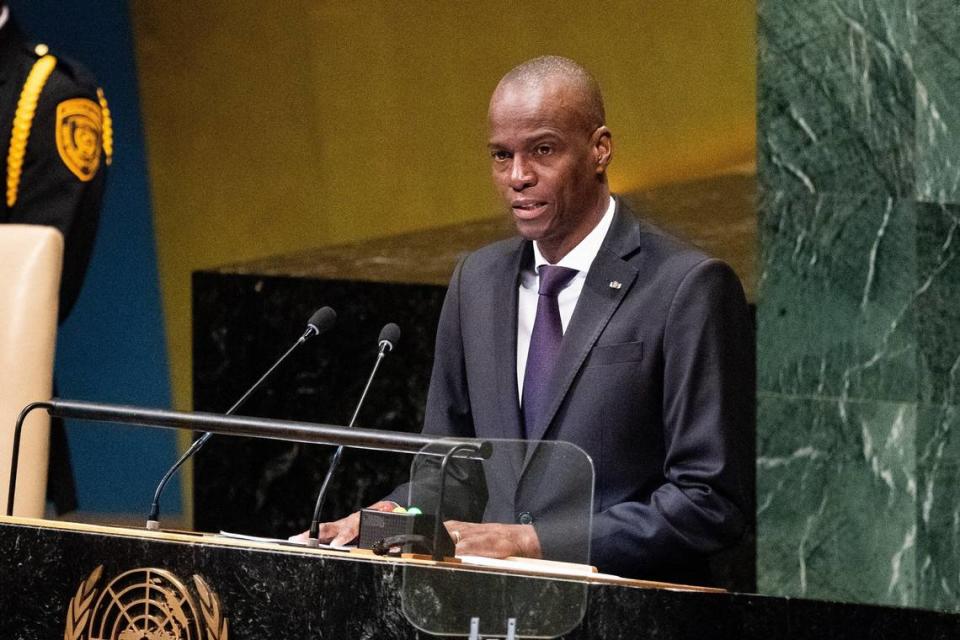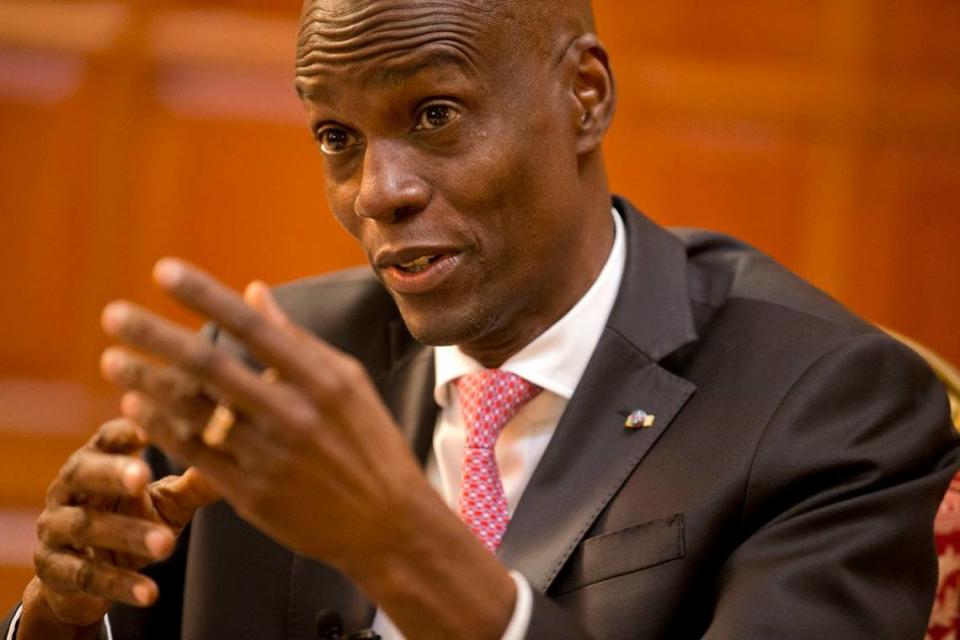Commando grabbed necklace, cash from Haitian leader’s home during assassination, FBI says
When a Colombian commando suspected of joining ex-soldiers in the fatal shooting of Haiti’s president escaped to Jamaica, he soon grew weary of life on the lam and arranged to meet with U.S. authorities to avoid being sent back to Haiti.
Mario Antonio Palacios Palacios, who had fled to Jamaica two months after the July 7, 2021 assassination, spoke by phone with someone he trusted: a Colombian military officer who once had been his boss.
The officer, Colonel Alberto Moreno, aka “Don Carlos” and “the Jackal,“ had visited the FBI’s office in Miami two years earlier and still had contacts there. He advised Palacios that his only hope was to meet voluntarily with U.S. investigators in Jamaica that October, according to an FBI agent’s testimony Tuesday in Miami federal court.
Through WhatsApp text messages, Moreno coordinated the meeting between Palacios and an FBI-led investigative team. When the squad, with assistance from the Jamaican police, picked up Palacios in a remote area about two hours from Kingston, he initially told one of the FBI agents that he was “scared.” He also asked the agent, Jacqueline Valdes, who gave him a bottle of water, a favor: to hold a necklace for him that he said belonged to his wife, she testified.
It turned out that Palacios was lying, Valdes said during pre-trial testimony in the FBI’s Haiti assassination case. She said that during a nearly six-hour video-recorded interview with federal agents on Oct. 7, 2021 at a hotel in Kingston, Palacios confessed that he took the necklace, two watches, $2,060 cash and other personal items belonging to Haiti’s president, Jovenel Moïse, and his wife, Martine, when he was killed and she was injured in the assault at their hillside home outside Port-au-Prince.
Palacios had stashed the valuables in a backpack — along with a hatchet, she said on the witness stand in federal court. She wasn’t asked by a federal prosecutor why Palacios was carrying the hatchet.
During questioning at the hotel in Jamaica, the FBI agent said that Palacios incriminated himself in the plot to kill Haiti’s leader when the Colombian commando admitted that “He was made aware they were going to assassinate the president the night before” at a meeting with other co-conspirators, instead of the initial plan to arrest him in a coup attempt.
‘The man was circulating among us every day.’ How cops nabbed Haiti assassination suspect
These new details in the FBI’s Haiti assassination case surfaced during the court hearing Tuesday, when Valdes and other federal agents testified about their questioning Palacios on two occasions in Jamaica in October 2021 — recorded statements akin to “confessions” that his lawyers, Joaquin Mendez and Alfredo Izaguirre, are seeking to get thrown out because they argue their client was under duress. If they prevail, it would weaken, but not destroy, the feds’ case against Palacios, who faces a potential life sentence.
Magistrate Judge Jacqueline Becerra is soon expected to issue a preliminary decision on that issue and whether to dismiss one of several charges against the 44-year-old Palacios. Her recommendation will then be reviewed by U.S. District Court Judge Jose Martinez, who is presiding over the Haiti assassination case in Miami, which has named 11 defendants — including several Haitian Americans and others from South Florida accused of recruiting the Colombian commandos — in the alleged plot to kill Haiti’s leader.
Of those, three defendants, including one of the Colombian commando leaders, Alejandro Rivera Garcia, aka “Colonel Mike,” have pleaded guilty to conspiracy charges carrying up to life in prison. Rivera is scheduled for sentencing on Friday. (About 20 ex-Colombian soldiers are in custody in Haiti as part of that country’s investigation. Three others died in a shootout after Moïse’s assassination; Palacios was the only Colombian commando who managed to flee Haiti before surrendering in Jamaica.)
During Tuesday’s court hearing, Mendez, the defense attorney, was able to confirm through questioning of Valdes that Palacios was never read his Miranda rights about having a lawyer present during the first interview on Oct. 7. He also confirmed through her that the FBI paid Palacios’ former boss in the Colombian military, Moreno, $15,000 for facilitating the meeting between him and federal agents in Jamaica — though he could not attend as planned because he got stuck in Miami under COVID-19 travel restrictions en route to the Caribbean island.
Mendez argued in court that Palacios was pressured into admitting his knowledge of the assassination plot beforehand and that the entire point of the feds’ meeting with him was to “extract” him from Jamaica, so he could be charged in the FBI’s then-unfolding assassination investigation. Mendez said that a plane ticket had already been purchased for his transfer from Jamaica to the United States.
Former Haitian senator pleads guilty in Miami to conspiring in presidential assassination
Valdes, the FBI agent, disagreed, saying that the purpose was to talk with him about his alleged role in the Haitian president’s assassination, saying she had no authority to arrest Palacios, who had entered Jamaica illegally and was being detained there.
In a court filing, Palacios’ lawyers argued that “the agents were relentless in their pursuit of that admission, and Mr. Palacios repeatedly denied that he had any prior knowledge of a scheme to kill the president. He maintained that he had never agreed to carry out such a mission. He also insisted (and continues to maintain) that he never fired his weapon in the President’s home.
“However, after five and a half hours into the interrogation ... Mr. Palacios finally capitulated and said he had been told of the change of plans (from arrest to murder) the night before the events. This crucial admission came after Mr. Palacios asked the agents to pause the recording machine so they could speak privately.”
Later on, a team of FBI agents interviewed Palacios a second time on Oct. 12, 2021 at the same hotel in Kingston — but this time they read him the Miranda rights and he signed a waiver form agreeing to talk with them without a lawyer present. Palacios’ lawyers still argue that their client didn’t fully understand U.S. law and his rights — though Palacios made the same admissions he had made in his first interview.
Bringing Palacios to the United States did not happen immediately — in fact, he wasn’t even transferred from Jamaica.
Ex-Colombian officer pleads guilty to plotting to kill Haiti’s president, agrees to help feds
Palacios was arrested in January 2022 by federal agents in Miami after arriving from Panama. He was the first person allegedly involved in the assassination of the Haitian president to be formally charged with a crime, providing support in the deadly plot.
Palacios had been in custody in Jamaica, which moved to deport him to his homeland of Colombia that January. But during a layover in Panama, he agreed to travel to the United States, according to federal authorities.
A criminal complaint, drafted by the FBI, accused Palacios of conspiracy to commit murder or kidnapping outside the United States and providing material support resulting in death, knowing that such support would be used to carry out a plot to kill the Haitian president. The criminal complaint had been filed under seal in federal court on Nov. 24, 2021.
Since his transfer, Palacios has pleaded not guilty to an indictment and has been held at the Federal Detention Center in Miami.
A year after his arrest, the Miami Herald reported that a cash fortune found in the Haitian president’s home might have been a motivating factor for the ex-Colombian soldiers to participate in the deadly plot.
Hours before a group of former Colombian soldiers raided the president’s residence at night, they were given new orders. Their mission, a squad leader allegedly told them, had changed and was now twofold: Find and kill Moïse, and find and grab bags of cash at his house, according to details of the Colombian investigation into the assassination.
The amount supposedly inside was between $45 million and $53 million, according to statements some of the jailed suspects in Haiti shared with Colombian and U.S. investigators looking into the brazen killing.
The substantial cash allegedly stashed inside the president’s home suggested that it may have provided additional incentive to carry out the fatal shooting, which the Colombian commandos are suspected of carrying out while Haitian presidential guards stood down.


